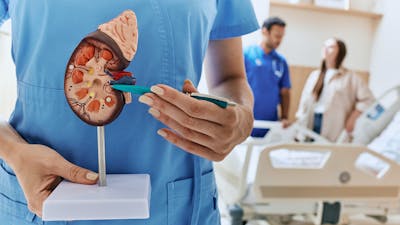Trestle Biotherapeutics licensed the combined technologies to create new standard-of-care options for patients with kidney failure.
The Problem

About 850 million people worldwide and 37 million people in the US suffer from kidney disease. Currently, there are only two treatment options for people whose disease progresses to outright kidney failure – dialysis or a rare kidney transplant. While dialysis is a life-saving treatment for more than 550,000 Americans, patients must endure constant medical risks of infection, vascular collapse, and often severe tolls on their quality of life. Kidney transplants are in extremely short supply: in the US alone, about 100,000 patients are waiting for a kidney transplant, yet, due to organ shortage, each year only 20,000 transplants are performed and nearly 5,000 patients on waiting lists are dying. Since the first patient was treated with repeated dialysis in 1960, and the first living-related kidney transplant was performed in 1954, no other treatments have been advanced to the clinic.
Our Solution
Jennifer Lewis, Sc.D., and her group at the Wyss Institute and Harvard John A. Paulson School of Engineering and Applied Sciences (SEAS), pioneered a novel tissue biomanufacturing platform. One of its central components, known as “sacrificial writing in functional tissue” (SWIFT), enables the fabrication of vascularized kidney tissues with the help of multimaterial 3D bioprinting technology. This solves a major challenge in the creation of larger tissue fragments that need to be constantly supported by oxygen and nutrients and cleared of waste products. The team used this approach together with other technologies to create 3D kidney-on-chip models for drug screening and disease modeling, and to lay the foundation for rapidly generating vascularized kidney tissue at scale for repair and regeneration.
The Journey
Key to the success of the Lewis team’s human kidney engineering approach was their collaboration with clinical researchers Joseph Bonventre, M.D., Ph.D., Chief of the Division of Renal Medicine and Founding Chief of the Engineering in Medicine Division at the Brigham and Women’s Hospital (Brigham), and Ryuji Morizane, M.D., Ph.D., an Assistant Professor at the Massachusetts General Hospital (MGH) and Harvard Medical School (HMS). Bonventre, Morizane, and others had developed a method for generating kidney organoids from human pluripotent stem cells in a culture dish. These contained large numbers of well-organized nephrons – the functional units of the kidney – but lacked a vascular network that could be perfused with blood. With the Lewis team’s expertise, this deficiency was overcome by exposing organoids to the flow of fluids in bioengineered devices. This approach also allowed kidney organoids to mature further towards functional tissue than without fluid flow.
We’re very excited to bring the biofabrication and stem cell biology technologies developed in the Lewis and Morizane labs into what we are building at Trestle. The teams at Harvard, Wyss, and the Brigham have a renowned track record in translational innovation, and we’re thrilled with the opportunity to carry their work forward for patients’ benefit.
Impact
In 2020, Ben Shepherd, Ph.D. and Alice Chen, Ph.D., two research-entrepreneurs aiming to provide implantable therapeutic kidney tissue to patients had founded La Jolla-based Trestle Biotherapeutics. Looking to complement their expertise in stem cell biology, tissue engineering, and regenerative medicine with additional methodology, they approached Lewis, Morizane and other researchers to discuss the Harvard team’s comprehensive kidney bioengineering capabilities. In 2022 Trestle was granted a license to commercialize a suite of stem cell- and 3D bioprinting-based kidney regenerative medicine technologies created at the Wyss Institute, SEAS, and Brigham. Lewis is a members of Trestle’s scientific advisory board. In 2023, Trestle joined the Wellcome Leap HOPE program which is focused on bioengineering complex human organs and immune system interactions and help Trestle advance the development of functional bioengineered kidney tissues. The company will join a multi-disciplinary team being led by Lewis.
